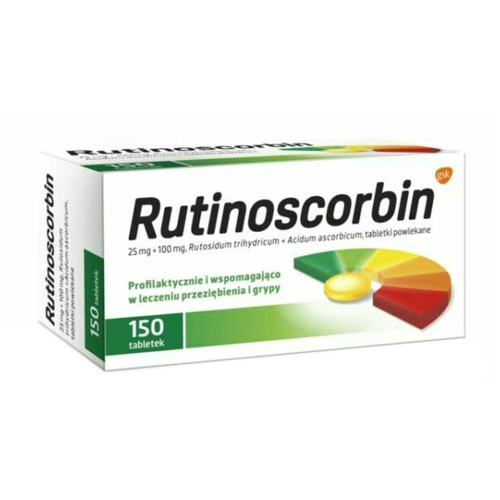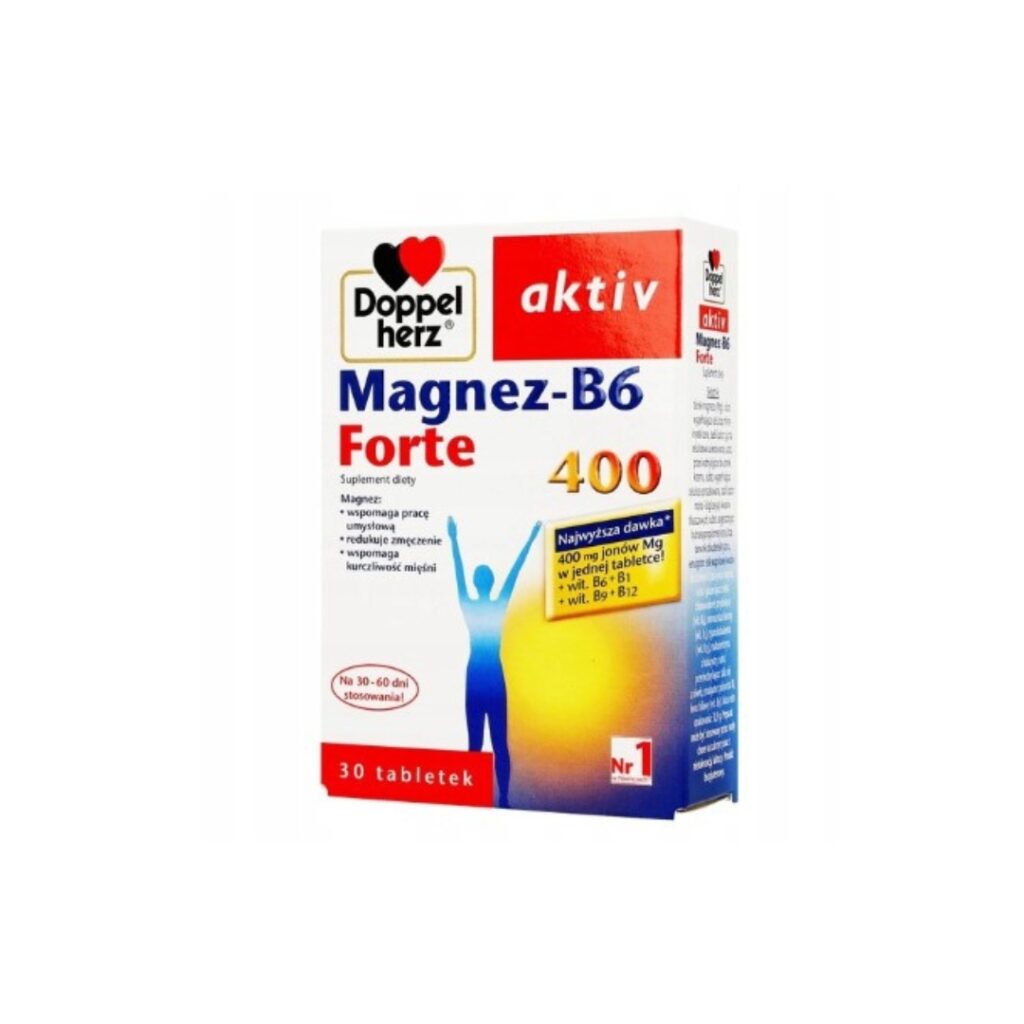Rutinoscorbin is an immune-boosting drug that contains two active substances: vitamin C (100 mg dose) and rutoside (25 mg dose).
- Rutoside strengthens blood vessels and reduces their permeability. In addition, it protects vitamin C against oxidation, thanks to which it retains its properties for longer.
- Vitamin C has an antioxidant effect. It is necessary in many metabolic processes, it participates, among others, in the formation of collagen and hemoglobin and facilitates the absorption of iron.
Rutinoscorbin is intended for adults and children from 6 years of age. Usually 1-2 tablets of Rutinoscorbin are used daily. In states of vitamin C deficiency, the dose can be increased to 1-2 tablets 2 to 4 times a day.
Symptoms
- in states of deficiency and increased demand for vitamin C (colds, viral infections, including flu);
- auxiliary in excessive vascular permeability.
Active substance: Acidum ascorbicum, Rutosidum
Composition of Rutinoscorbin
Rutinoscorbin (150 Tablets) active substances rutoside and ascorbic acid (vitamin C). One tablet contains 25 mg of rutoside and 100 mg of ascorbic acid.
The other ingredients are: lactose monohydrate, potato starch, sucrose, polyvinyl alcohol, talc, magnesium stearate. The tablet coating consists of: Opadry II 85F32876 Yellow (polyvinyl alcohol, macrogol 4000, titanium dioxide (E171), talc, quinoline yellow (E104)).
Dosage
The recommended dose is:
- prophylactically: from 1 to 2 tablets a day;
- in states of vitamin C deficiency: 1 to 2 tablets 2 to 4 times a day.
- The drug is administered orally.
- In children under 6 years of age, Rutinoscorbin should be used as directed by the doctor.
- Patients with kidney problems should not take more than 5 tablets a day (corresponding to 500 mg of vitamin C).
- Do not use doses higher than recommended.
Always use Rutinoscorbin exactly as described in the package leaflet or as directed by your doctor or pharmacist. Check with your doctor or pharmacist if you are not sure.
When should you not take Rutinoscorbin?
- allergic (hypersensitive) to rutoside and ascorbic acid (vitamin C) or any of the other ingredients of this medicine;
- or have had oxalate stones in the past (a disease whereby deposits are made of what are called ‘stones’ in the kidneys);
- diseases related to the excessive accumulation of iron (thalassemia, haemochromatosis, sideroblastic anemia) or other diseases that can cause excess iron in the body.
Contents
150 film-coated tablets
Storage
Below 25 ° C
Manufacturer
Warnings
Do not use doses higher than recommended.
Talk to your doctor or pharmacist before using Rutinoscorbin:
- if you have a rare metabolic disease (erythrocyte glucose-6-phosphate dehydrogenase deficiency) which may lead to the breakdown of red blood cells and anemia;
- if you have kidney problems. Do not take more than 5 tablets (corresponding to 500 mg of vitamin C) a day;
- if you are taking sulphonamides (antibacterial medicines).
High doses of vitamin C (above 1 g) are not recommended if the patient has:
- excessive excretion of oxalic acid;
- urolithiasis (a disease where there are stones in the urinary system called ‘stones’);
- gout (a chronic disease associated with a disorder of uric acid metabolism);
- cystinuria (a metabolic disease);
- hypokalaemia (low blood potassium);
- hypercalcaemia (increased blood calcium levels).
Rutinoscorbin contains lactose monohydrate and sucrose. If you have been diagnosed with an intolerance to some sugars, consult your doctor before taking the drug.
Rutinoscorbin contains quinoline yellow and therefore may cause allergic reactions.
Pregnancy and breastfeeding
- If you are pregnant or breastfeeding, think you may be pregnant or are planning to have a baby, ask your doctor or pharmacist for advice before taking this medicine.
- Vitamin C passes into breast milk and crosses the placenta.
- The safety of use during pregnancy and lactation has not been established.
Overdosage
In the event of taking more than the recommended dose of the drug, consult a physician or pharmacist.
Diarrhea may occur at very high doses, there is a risk of haemolysis (breakdown of red blood cells), kidney stones, water and electrolyte disturbances and a significant reduction in the effect of cobalamin (vitamin B12).
Interactions with other drug
Vitamin C contained in the drug:
- increases the absorption of metal compounds (mainly iron);
- increases the absorption of aluminum (a component of antacids, used, for example, to treat indigestion and heartburn). If you are taking vitamin C, you should not take antacids, especially if you have kidney disease;
- when used together with deferoxamine (a drug used to overdose iron and help remove excess iron from the body), it may adversely affect the heart in the early stages of treatment;
- may increase the adverse effects of acetylsalicylic acid (aspirin) on the stomach. In turn, acetylsalicylic acid may interfere with the absorption of ascorbic acid;
- enhances the effect of paracetamol and coumarin anticoagulants (e.g. acenocoumarol);
- reduces the effectiveness of disulfiram (a drug used to treat alcoholism);
- when used together with sulfonamides (antibacterial drugs), it may cause crystals to form in the urine;
- long-term use in high doses may affect the elimination of some drugs (e.g. tricyclic antidepressants, e.g. imipramine, amitriptyline).
Side Effects
Like all medicines, Rutinoscorbin (150 Tablets) can cause side effects, although not everybody gets them.
When taking vitamin C doses higher than 600 mg per day, side effects may occur:
Very rare side effects (may affect up to 1 in 10,000 patients):
- allergic reactions, including hypersensitivity reactions (shortness of breath, swelling of the face, lips, tongue or throat, skin rash, itching);
- headache, dizziness;
- vomiting, nausea, diarrhea, indigestion, stomach pain;
- tiredness.
Other side effects can occur in a small number of people but their frequency is not known.
- reddening of the skin;
- increased urination, kidney stones.
Very high doses of vitamin C (more than 10 g per day) may cause fluid and electrolyte disturbances, lysis (breakdown) of red blood cells and a significant reduction in the effect of cobalamin (vitamin B12).
If you notice the following symptoms: nausea, vomiting, diarrhea, headache, reddening of the skin or increased urination, stop taking Rutinoscorbin immediately and contact your doctor.




